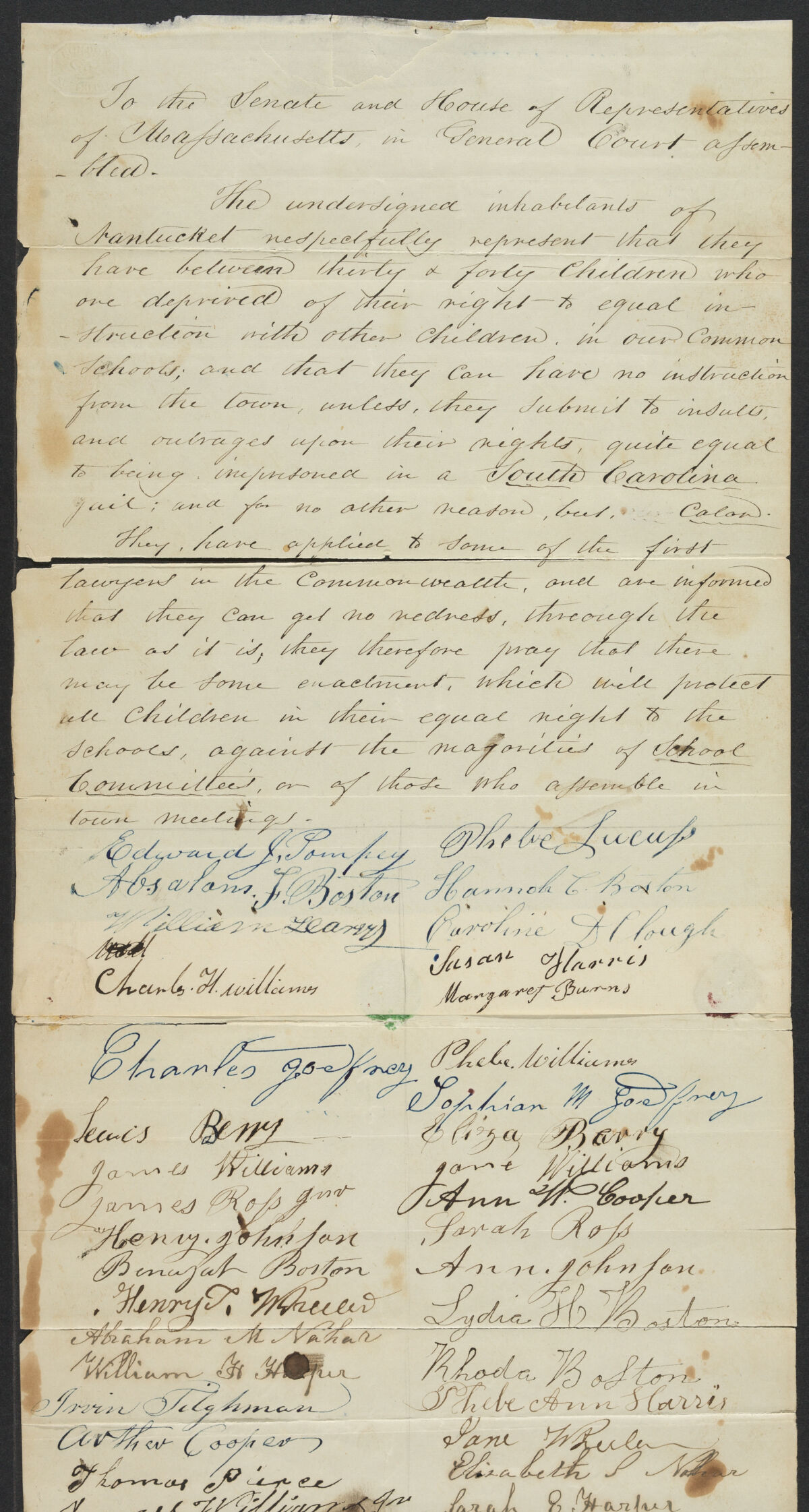EVENT
Battle to Desegregate Schools

In 1840, Eunice Ross, a student of the York Street School on Nantucket, was denied access to the all-white high school on the island. As this was the only high school on the island, Eunice was forced to discontinue her studies. Members of Nantucket’s Black and Indigenous community and their white supporters took action.
After heated political struggles, including a lengthy boycott of the York Street School, failed to desegregate Nantucket's high school, the fight was taken to the state capital. On January 16th 1845, Edward J. Pompey and 104 others, including Absalom Boston and members of the Ross family, petitioned the Massachusetts Senate and House of Representatives. They implored the state to enact laws that would protect the “30-40 children who are deprived of their right to equal instruction with other children in our Common Schools, and that they can have no instruction from the town, unless they submit to insults and outrages upon their rights, quite equal to being imprisoned in a South Carolina jail, and for no other reason, but color.” Two petitions from white islanders in support of E.J. Pompey's petition quickly followed, as did two petitions by white islanders against it.(1) In February, Eunice Ross sent a personal account in support of the E.J. Pompey petition describing how exams administered by the school committee in 1840 had shown her to be “amply qualified” to attend the high school, yet a town vote had barred her from attending on account of her color. (2)
In March 1845, Massachusetts responded by passing An Act Concerning Public Schools which stated that any child excluded from public school instruction in Massachusetts had the right to sue the city or town for damages. (3,4) At first, Nantucket chose not to abide by the new law. This all changed when, in 1846, Absalom Boston announced his intention to sue on behalf of Eunice Ross and his daughter Phoebe. Given Boston's considerable wealth and dedication to the issue, the island opted to desegregate the high school before Boston could even file the paperwork. Eunice Ross was, by then, twenty-four years old.
Although the Nantucket Indigenous and Black community was able to make great strides in desegregating schools on the island and ensuring access to education for all in Massachusetts, this did not translate to desegregation across the state. It would not be until 1855 that the Massachusetts legislature passed the country’s first law banning school segregation. (7, 8)
1. White, Barbara Ann. “Black Activism Before the Civil War.” Historic Nantucket, vol. 12, no. 2, Early Fall 2022. p14 (https://nha.org/research/nantucket-history/historic-nantucket-magazine/early-fall-2022/)
2. White, Barbara Ann. “Who was Eunice Ross?.” Museum of African American History Boston & Nantucket Newsletter.(https://myemail.constantcontact.com/Nantucket--Rich-in-Black-History.html?soid=1101065259098&aid=q2850Ey_Swc)
3. "An Act Concerning Public Schools," in Acts and Resolves Passed by the General Court (Session Laws, Boston, 1845) p544. (https://archive.org/details/actsresolvespass184345mass/page/544/mode/2up)
4. March 25, 1845: Legislature Guarantees Access to Public Schools” MassMoments (https://www.massmoments.org/moment-details/legislature-guarantees-access-to-public-schools.html)
7.“The Sarah Roberts Case.” National Park Service (https://www.nps.gov/articles/the-sarah-roberts-case.html)
8. Mabee, Carleton. “A Negro Boycott to Integrate Boston Schools.” New England Quarterly 41 (September 1968) p341-361.(https://primaryresearch.org/pr/dmdocuments/bh_mabee.pdf)
Image: 1845 Petition signed by 105 people of color on Nantucket equal demanding access to education (http://nrs.harvard.edu/urn-3:FHCL:10520834)


